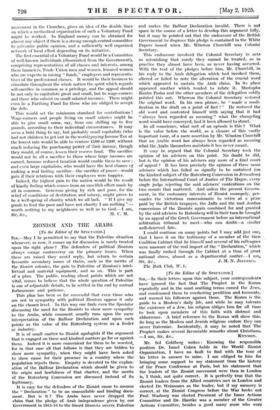ZIONISM AND THE ARABS
[To the Editor of the SPECTATOR.] SIR,—May I be permitted to say that the Palestine situation whenever, as now, it comes up for discussion is rarely treated upon the right plane? The defenders of political Zionism always escape controversy on the primary issues. When these are raised they avoid reply, but return to certain favourite secondary issues of theirs, such as the merits of the Zionist colonies, the gain to Palestine of Zionism's intel- lectual and material equipment, and so on. This is part of a plan. The public, reading about points which are not vital, comes to believe that the whole question of Palestine is one of adjustable• details, to be settled in the end by mutual forbearance and patience.
This plan has been so far successful that even those who
are not in sympathy with political Zionism oppose it only on the chosen level. In this way one finds even the Spectator discussing the need for the Zionists to show more sympathy to the Arabs, while comment usually runs upon the mere interpretation of the Balfour Declaration and upon such points as the value of the Rutenberg system as a feeder of industry.
It is of small. matter to Zionist apologists if the argument that is engaged on these and kindred matters go for or against them. Indeed it is more convenient for them to be worsted, for in that case all that follows is that they are bidden to show more sympathy, when they might have been asked to show cause for their presence in a country where the population rejects them. Enquiry is devoted to the explan- ation of the Balfour Declaration which should be given to the origin and lawfulness of that charter, and the merits of the Rutenberg Concession are discussed instead of its legitimacy.
It is easy for the defenders of the Zionist cause to assume
the " Declaration " to be an unassailable and binding docu- ment. But is it ? The Arabs have never dropped the claim that the pledge of Arab independence given by our Government in 1915-16 -to the Sherif Hussein covers Palestine
and makes the Balfour, Declaration invalid. There is not space in the course of a letter to develop this argument fully, but it may be pointed out that the endeavour of the British Government to disprove this pledge is contained in the White Papers issued when Mr. Winston Churchill was Colonial Secretary..
This endeavour involved the Colonial Secretary in acts so astonishing that surely they cannot be treated, as in practice they almost have been, as never having occurred. With the • text of the pledges before him, Mr. Churchill, in his reply to the Arab delegation which had invoked them, altered or failed to note the alteration of the crucial word which appeared to sustain the Arab claim. In its place appeared another which tended to refute it. Mustapha Kazim Pasha and the other members of the delegation coldly pointed this out. Whereon the Colonial Secretary restored the original word. In his own phrase, he " made a modi- fication in the draft on a point of fact ! " He restored the old word and contented himself with saying that it had " always been regarded as meaning " what the changeling word would have conveyed, had it been allowed to stand.
In all conscience, what sort of an episode is this ? What is the value before the world, as a closure of this vastly important issue, of a mere assertion by Mr. Winston Churchill that an Arabic word has always been regarded as meaning what the Arabs themselves maintain it has never meant.
It may be argued that the Colonial Secretary took the opinion of his advisers on this point. No doubt he did, but is the opinion of his advisers any more of a final court of appeal ? It has been precisely the opinion of these same advisers which has failed so signally to be sustained (on the kindred subject of the Rutenberg Concession in Jerusalem) before the International Court of Justice of The Hague, every single judge rejecting the said advisers' contentions on the two counts that mattered. And unless the present Govern- ment, in the customary interests of Zionist monopoly, per- suades the victorious concessionaire to retire at a price paid by the British taxpayer, the Jaffa and the vast Jordan concessions of the Zionists again combined for and granted by the said advisers to Rutenberg will in their turn be brought by an appeal of the Greek Government before an international arbitration tribunal to meet—who can doubt—a similar well-deserved fate.
I could continue on many points but I may add just one; that I have it on the testimony of a member of the then Coalition Cabinet that he himself and several of his colleagues were unaware of the real import of the " Declaration," which was finally rushed through the Cabinet at a time of great national stress, almost as a departmental matter.—I am,










































 Previous page
Previous page